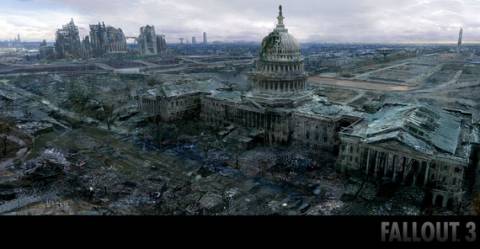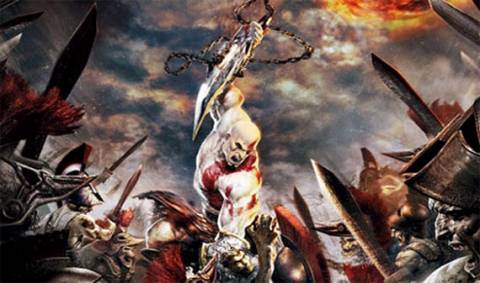Why the Supreme Court Should Rule Against California
By esotericus 1 Comments
How fitting. Just two weeks ago, I was helping Kratos rip off the head of Helios and batter Poseidon into a pulp, and last night I was busy slashing the throats of guards in Assassin's Creed. That doesn't even count the hordes of zombies I slaughtered in Borderlands shortly before going to bed. All told, I'm fairly certain I killed a number comparable to the population of Wyoming during the last fourteen days. And then yesterday I learned that the topic of violence in video games is once again in the news, and this time it's going all the way to the Supreme Court. Also fittingly, this debate is relevant to fellow Chicagoan Roger Ebert's unpopular claim last week that video games can never be art.
For those of you who don't know, the basic story is that in 2005, Governor Schwarzenegger (of all people) signed into law a California bill that aims to keep excessively violent games out of kids' hands. I think that's a goal we all shoot for, but California took it a step further. It is expressly against the law there for a store to sell a video game to a minor (defined as anyone under the age of 18 ), and anyone who's caught doing so is subject to a $1,000 fine. Specifically, the law states that games that feature the "killing, maiming, dismembering or sexually assaulting an image of a human being" or games that cater to "deviant or morbid interests" or those without "serious literary, artistic, political or scientific value" must be deemed off-limits to those under 18.
On a certain level, I get this. As a 30-year-old man, I'm a staunch supporter of the "M" rating for games as I believe they serve as a guidepost for parents who may not be into the whole gaming thing and thus out of the loop. I admit to feeling rather horrified recently upon learning that a 10-year-old cousin of mine had played the God of War games, and I thoroughly believe that Kratos should be an adults-only character.

But on the other hand, making such restrictions an actual law simply leaves too many gates open, and I believe the Supreme Court will realize the same. The main reason why I think this law will be overturned is that the video game industry itself does a remarkable job of regulating itself, chiefly through the ratings that are given to each game upon release. To my knowledge, every major console currently on the market—the XBOX, the PS3, and the Wii—has age restrictions measures built in so parents can keep certain games off-limits to their children. And that should be the end of the story. This is similar to the restrictions that are already in place on several satellite programs to keep kids from watching R-rated films. At the minimum, though, this law raises the question of what violence in video games consists of in their eyes. Is Little Big Planet to be attacked by this law because the Cutest Video Game Character Ever detonated a cute bomb that knocked the bad guy off a platform?
What's particularly bad about this law is that it treats video games on the same level as porn, cigarettes, and alcohol. Granted, 7-11 has recently started keeping video games behind the counter, but I don't think that's how they mean for us to see it. Video games today are a surprisingly social pastime and hobby despite the outdated myths, particularly in this day and age in which you can play with anyone around the world through the console networks, to say nothing of what you encounter in MMOs. I myself have met most of my best friends through video games. That, and console games in particular are almost always played in the living room of the gamer's home, where they are in full sight of their roommates, their significant others, their friends, their children, and, yes, their parents. This openness of the gaming world within the home ensures that gamers are always under the watchful eye of a loved one, and anyone with authority could stop little Johnny from playing. This is in direct contrast to activities such as looking at porn, smoking, or drinking alcohol, which minors usually do (at least in the neck of the woods where I grew up) either in utter privacy or back behind a building somewhere away from their parents. Already we see that there are plenty of opportunities to keep these games out of kids' hands if these Concerned Parents see fit.
Another indirect prohibitive measure is the cost of the games themselves. To begin with, consoles cost around $300 at the bare minimum these days, and most new releases cost a minimum of $50. This in itself keeps kids from buying the games themselves, as I don't know of a single kid under 15 that makes enough money to support a hobby like that. If they do—and presumably they're making this money from a job—then I say more power to them. If they've already proven that they're responsible enough to hold a job while supporting this hobby, then they're responsible enough to buy a game. And if they made it that far? Most game retailers that I know of have enough sense to ask for IDs when selling a Mature-rated game.

Finally, video games are currently in a type of golden age. Games that were created only three years ago already seem out-of-date and rough around the edges. Much like their audience, which numbers a very hefty chunk of full-grown adults, video games are growing. Every year a game or three comes out with a new way of heightening the interactive experience, and with every year video game stories come close to outdoing movies—and in many cases, they have. While it is undoubtedly violent, one would be hard pressed to say that Bioshock, for instance, is devoid of "serious literary, artistic, political or scientific value."In short, we are witnessing a field in that great age that surrounds the early years of all new media in which it marches triumphantly onto the scene, experimenting, evolving, and striving ever closer, Mr. Ebert, towards art. If anything, I believe we need more new minds to join in.
But all this is beside the point. The fact remains that game sales have been exploding by the millions, and in that time our national crime rate has been dropping. I don't believe there's a true connection between video game and violence at all: three games of God of War have not made me start slashing away at the idiots at the subway stations who try to push me aside as I'm trying to exit the train. I certainly don't want our country to become like New Zealand, which once seriously proposed that parents who let their kids play age-restricted games be fined $10,000 NZD (roughly $5,000).I'd like to think that we still have a bit more freedom than that.
In closing, I'd like to point out that the effect of this law probably wouldn't amount to much other than putting a few GameStops out of business. For the last several months I have bought all of my games online, and I can't imagine that the rest of the country is much different, particularly for people who don't live in a gigantic metropolis like I do. And not only do we buy our games online, but it's well known that millions of people play Internet-based games that require no download and often no purchase. The video game industry is rapidly moving away from its brick-and-mortar origins and into a digital world that—one might say—almost developed around it. This law, while well-intentioned, is vastly out of date and has no place in a modern society. You'd think California of all places would know that.
And now, if you don't mind, I'm off to kill some more zombies.
